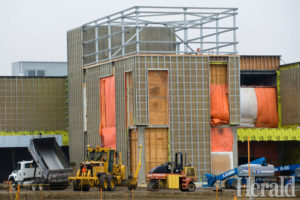Annual report shows City debt has grown
By Lethbridge Herald on April 20, 2020.
 Herald file photo by Ian Martens -
Construction of the ATB centre, seen underway in 2015, was one of a number of major capital projects that contributed to the City's accumulation of debt. @IMartensHerald
Herald file photo by Ian Martens -
Construction of the ATB centre, seen underway in 2015, was one of a number of major capital projects that contributed to the City's accumulation of debt. @IMartensHerald Tim Kalinowski
Lethbridge Herald
tkalinowski@lethbridgeherald.com
While the City of Lethbridge is in good shape relative to other municipalities in Alberta, with a fairly low debt to debt ceiling ratio, long term and short term debt have grown at a concerning pace over the last five years.
According to a report on the City’s 2019 finances submitted by City Treasurer Hailey Pinksen in the past year from 2018, where the City had a surplus of $4 million in Net Financial Assets, we are now sitting at a debt of $33 million.
Net Financial Debt, according to Pinksen’s report, is an indicator that future financial resources are required to pay for past transactions and events. This accumulation of debt was mainly due the construction of several major capital projects, including the ATB Centre, which also ties into the City’s long term debt picture.
Pinksen’s report shows the ATB Centre is directly tied to $58 million in City’s debenture or longer term debt in the 2019 budget year. Debenture debt is debt where the City had to borrow money to complete the project or meet the budgetary requirements.
The ATB Centre will take 15 years to pay off, and should be taken off the City’s books by 2033.
Other significant areas adding to an increase in debenture debt from 2015, when it stood at $90 million, to 2019, where it now stands at $228 million, include increases in debt due to upgrades at the City’s electrical utility ($35 million), in the area of Waste and Recycling ($25 million), and for Wastewater ($20 million) and Water ($15 million) upgrades.
The City’s current debt limit imposed by the Municipal Government Act is set at $612 million; so the $228 million currently on the books is not quite half-way there.
Mayor Chris Spearman these long term and short term debt increases show that the City cannot continue to fund major infrastructure projects as they have over the past five years.
“What that does is highlight to the community that none of these significant projects are free,” he said, “and we have to be careful as we take on additional projects that these don’t create an added burden on property tax payers. It’s important to have grant programs from the federal government and from the provincial government that support capital projects, We just can’t go forward continuing to finance projects that will be funded by (local) taxpayers.”
Spearman also acknowledged the debt numbers presented by Pinksen were only as of December 2019, and did not take into account what amount of debt will be added due to the COVID-19 pandemic for the 2020 fiscal year.
“We don’t know fully what it will be,” he confirmed. “We will get an additional update (from City staff) by September letting us know how we did until the end of June. And there will be another report just before Christmas as well on where we are financially. So we will continue to monitor that (debt situation), and we will have to maybe make some adjustments as needed.”
Follow @TimKalHerald on Twitter
-1



Zero-deficit budgeting for governments must be required. How can we allow governments to incur debt we, or our children, have to pay for at the same time as they break our savings with highest ever taxes going to generally unapproved and disliked pet projects?